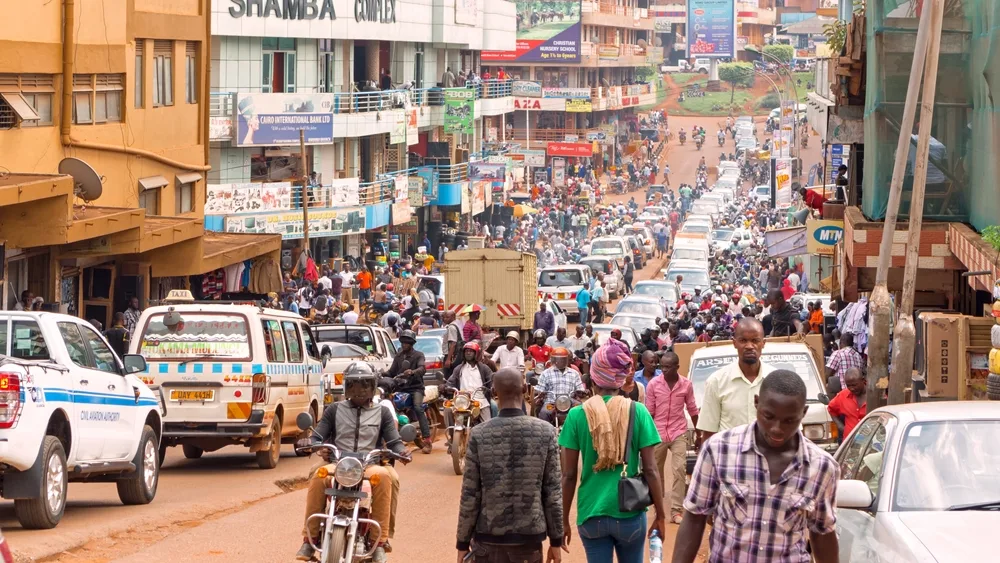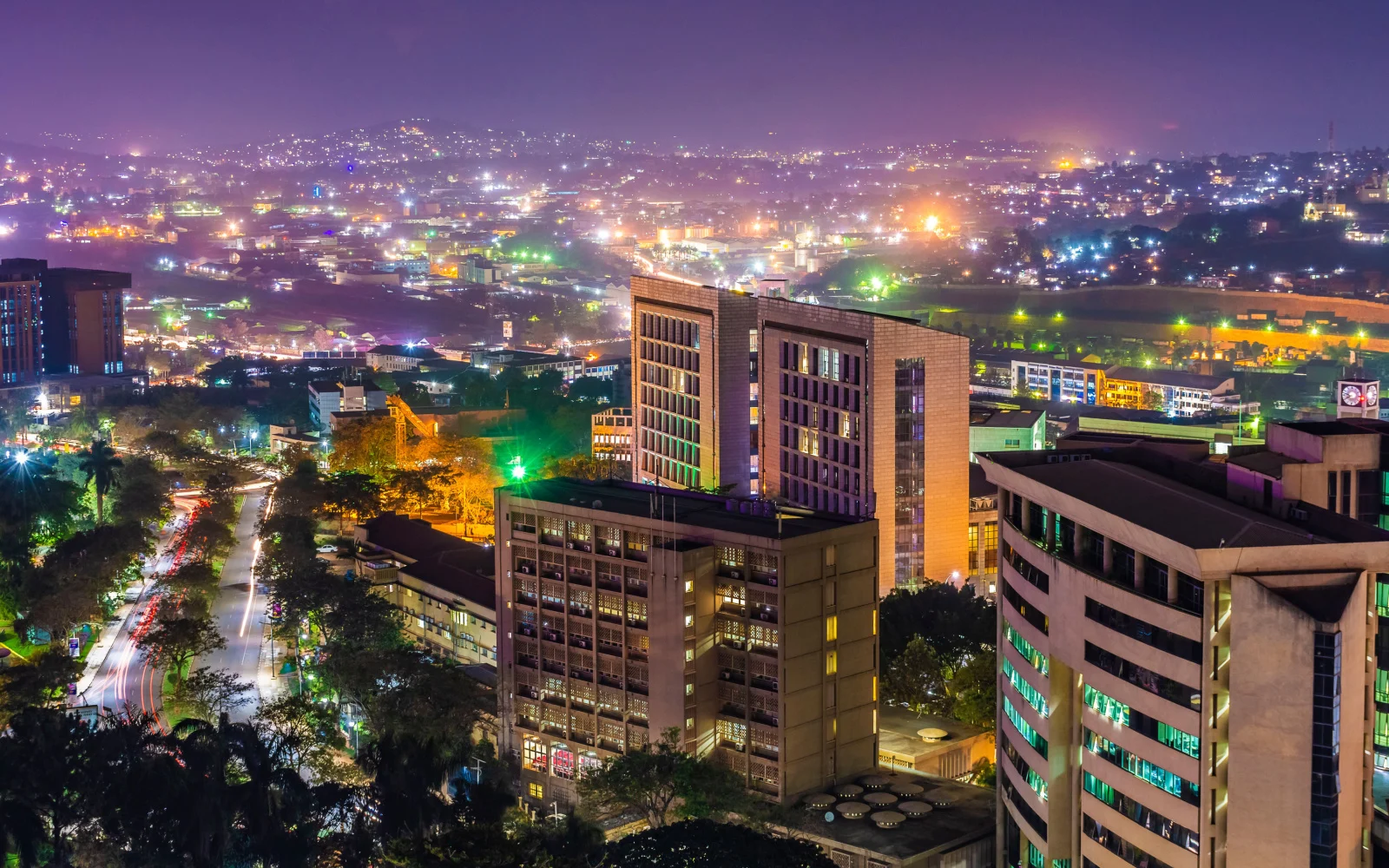Uganda represents an off-the-beaten-path destination with plenty of charm to offer those who venture here. The country is not one of the most popular tourist destinations in Africa by any means, receiving only 1.5 million visitors in 2019.
But it’s also one of the most popular destinations in East Africa. Visitors to Uganda are usually here to see wildlife and beautiful nature.
The country is one of the best places on Earth to spot gorillas or chimpanzees at parks such as Bwindi Impenetrable Forest National Park. There are other natural wonders, such as Lake Victoria, one of the biggest lakes in the world, and the impressive Rwenzori Mountains.
This storied country is definitely an ideal destination for the adventure traveler, but it’s not all sunshine and gorillas. So, is Uganda safe to visit? Here’s our take.
Is Uganda Safe to Visit in 2025?

mbrand85/Shutterstock
Not really. You need to exercise a lot of caution when visiting Uganda, and cautious travelers will want to reconsider travel completely.
Terrorism and civil unrest are also likely to happen sometimes, and it’s easy to get caught in the wrong place at the wrong time. The United States State Department has a Level 3 travel advisory in place, urging its citizens to reconsider travel to Uganda due to the threat of crime and terrorism.
While other governments, such as Australia and Canada, don’t have such high warnings in place, they also warn their citizens to be careful about traveling to Uganda.
Common concerns when planning travel to Uganda include:
- Bag snatching and other forms of petty theft
- Break-ins
- Armed robbery
- Highway robbery
- Assault
- Sexual assault
- Terrorism
Violent crime rates across the country are high, and local police are not always the best at preventing or responding to crime. Foreigners are often targeted because criminals know they tend to be wealthier than locals, so they make for more attractive bait.
Besides run-of-the-mill crime, you should also be concerned about civil unrest and terrorist violence. The political situation in Uganda has been unstable for a while, and protests are common.
Protests can turn violent, especially due to aggressive state responses and shutdowns of dissidents. You don’t want to get caught up in the crowd, so it’s best to stay away from protests, which many governments, including the UK, advise their citizens to do.
Most governments warn their citizens about terrorist attacks in Uganda. While there weren’t any major terrorist attacks in the country in 2022, 2021 saw a spate of attacks, including deadly bombings in the capital Kampala.
There are several active terrorist groups operating within the borders of Uganda, including al-Shabaab and the Lord’s Resistance Army, which is still headed by the infamous warlord Joseph Kony (of Kony 2012 fame).
Finally, many visitors to Uganda are here for the natural beauty but are not conscious of the dangers that nature poses.
Animals such as gorillas, chimpanzees, and hippos are wild animals, not tame pets, no matter how cute they look. Always make sure that you stay a safe distance away because they can kill or maim you.
Other threats include natural disasters. During the rainy season, from March to May and October to November, flooding can happen, so be sure to keep track of weather forecasts.
Crime in Uganda

Shujaa_777/Shutterstock
The biggest problem people worry about when visiting Uganda is crime, and with good reason — the country has very high crime rates.
Canada warns its citizens to exercise a high degree of caution in the country precisely because of the crime rate, and it is not alone in issuing this advisory to its citizens. The problem with Uganda’s crime rate is that the violent crime rate is very high.
According to Macrotrends, the violent crime rate is 9.75 incidents per 100,000 people, which is higher than the global average. Although it has been decreasing over the past few years, that is still a very high crime rate.
Property crime, from run-of-the-mill pickpocketing to armed robbery and break-ins, is also very common. Criminals often target foreigners, including U.S. citizens, because they know that foreigners will be plusher targets than locals.
According to OSAC, Uganda, especially the capital Kampala, is a critical location for crime. The most violent forms of crime, such as kidnapping, rape, and murder, usually affect locals primarily.
However, don’t think that you’re protected just because you’re a foreigner. There have been instances of foreign citizens getting kidnapped in the past, although they are rare. Sexual assault against foreigners is most common, usually in the aftermath of an armed robbery.
Ugandan authorities and local tour operators take violence against foreigners seriously and have taken measures to limit violent incidents, such as adding security to gorilla treks in the wilderness to prevent wild attacks.
However, visiting Uganda is definitely not for the careless traveler, as you will have to be on your guard as you move around.
Petty Theft
Petty theft is pretty much a global problem, and Uganda is not immune. Pickpocketing and other forms of robbery are very common in the country, especially in larger cities such as the capital Kampala.
The robbery incidence rate is usually around 16 incidents per 100,000 people. Pickpockets operate pretty much everywhere in Uganda.
In Kampala, they frequent places that ex-pats and tourists visit, such as public transportation, cafés, restaurants, and malls. It’s common for thieves to take valuables out of bags placed beneath seats in mini-buses or hanging off of seats in restaurants.
As prevention, many travel insurance companies and foreign governments tell citizens to maintain positive control of valuables. That means keeping your valuables under direct control at all times.
It’s not enough just to keep your bag somewhere near your body — you should keep it within your line of sight or in physical contact with you. Bag snatching is also common in Uganda, especially in bigger cities like Kampala.
Thieves will use motor vehicles, such as local motorcycles called boda bodas, to quickly scope out, attack, and get away from victims.
Be careful when walking on streets where pedestrians have to walk close to traffic. Always walk facing the direction of traffic so it’s harder for someone to sneak up on you, and keep a strong grasp on your valuables.
Break-ins are becoming more common, both vehicular and accommodation break-ins, so make sure that the place you stay in has good security. Outside of Kampala and other bigger cities, many hotels don’t have great security, so try not to take many valuables with you, as hotel room theft is common.
Armed Robbery
Regular theft is not your biggest concern when visiting Uganda. The country also has very high rates of armed robbery. The U.S. State Department states that many incidents of crime tend to target U.S. citizens and other foreigners, especially in Kampala.
Armed robbery and other forms of violent robbery are prevalent all over Uganda. The good news is that it is fairly easy to avoid (although your threat is never completely eliminated).
Reports show that most cases of violent robbery in Kampala occur at night. By traveling during the day and only with a larger group through secure private transportation at night, you greatly minimize your chances of being the victim of an armed robbery in Kampala.
Armed groups sometimes operate on the roads and highways of Uganda, especially at night. Be careful of roadblocks as they are often operated by organized criminals who assault unlucky victims, including committing sexual assault.
Avoid driving in Uganda by yourself, especially at night. The Australian government has a few other tips for its citizens to avoid being victims of armed robbery in Uganda — these can apply to all visitors.
When exploring unfamiliar locations, do so during the day or with a group. Lock the doors and windows to your car and accommodation. Any little thing you can do to deter a criminal is an additional degree of safety.
Some taxi or matatu (minibus) drivers work in league with robbers or are robbers themselves. Avoid taking these transportation options by yourself, especially at night.
Only hop onto a matatu if there are several other passengers on board. When only one or two other people are in a shared minibus, it could mean they are accomplices to the driver or other criminals.
Avoiding Bad Areas

Daily street life in Kampala is chaotic with messy traffic, taken on April 20, 2017/Wirestock Creators/Shutterstock
The security situation in Uganda varies drastically depending on where you go, so it pays to stay alert and avoid bad areas. Be sure to check your country’s tourism warnings because they are often region-specific.
The Canadian government and many other foreign governments advise their citizens to stay away from the border with South Sudan. Unrest in South Sudan frequently bleeds over the border in the form of banditry and organized criminal groups.
The land border with the Democratic Republic of the Congo is also home to frequent unrest spilling over from the neighboring country.
It is possible to travel here safely, but only if you stick to well-established routes such as popular national parks and travel with a guide. Karamoja province in northeastern Uganda is also home to lots of unrest.
Intertribal clashes are common in this rural province, as are cattle rustling bandits. While most of these problems affect locals, sometimes foreigners get caught in the crossfire.
Kampala, the capital, is where most tourists enter and exit Uganda, but it has fairly high crime rates. Try to avoid bad traveling at night and down unfamiliar alleyways.
Things to Consider
Here are some other things to keep in mind for safety’s sake in Uganda:
- Ugandan society and laws are very homophobic, and violence against LGBT locals and travelers is sadly common. If you identify as LGBT, this is not a safe place to visit.
- Uganda has many contagious diseases, such as yellow fever and malaria, so make sure you have all your vaccines. It had an Ebola outbreak, but at the beginning of 2023, the country announced that it was over.
- The roads in Uganda are poorly maintained, and drivers are known for being wild, so be careful if you are renting a car.
Frequently Asked Questions

LarsEmil/Shutterstock
Here are some of the most common questions other travelers to Uganda had:
Is Uganda safe for tourists in 2023?
Uganda is no more dangerous for tourists in 2023 than it has been in the past. There are many concerns, such as violent crime and terrorism, that the country has been battling for years, but with some basic precautions, you can avoid the worst.
What should I avoid in Uganda?
In Uganda, avoid things that single you out as a target, such as walking alone at night in unfamiliar areas or flashing valuables. Avoid offending the conservative local culture by wearing revealing clothing, showing public displays of affection, or being ostentatious.
Is Uganda safe for female tourists?
Many female tourists visit Uganda without a problem. However, sexual assault against foreigners sometimes happens, and victims are at risk of contracting HIV.
Is it cheap to visit Uganda?
Yes, Uganda is very affordable. Not only is it much cheaper than Europe or many Asian countries, but it is also even cheaper than many neighboring countries such as Tanzania.
Are safaris safe in Uganda?
Safaris are generally safe in Uganda. However, make sure that you book with a reputable tour operator and that you follow all instructions to the letter. Safaris are an opportunity to get up close and personal with wild animals, and you don’t want to get on their bad side.
So Is Uganda Safe to Visit in 2025?
Although hundreds of thousands of people visit Uganda each year without anything bad happening, it is true that the country has an elevated rate of violent crime. Ultimately, it is up to you to figure out if the risk isn’t worth it for you. Happy travels!



